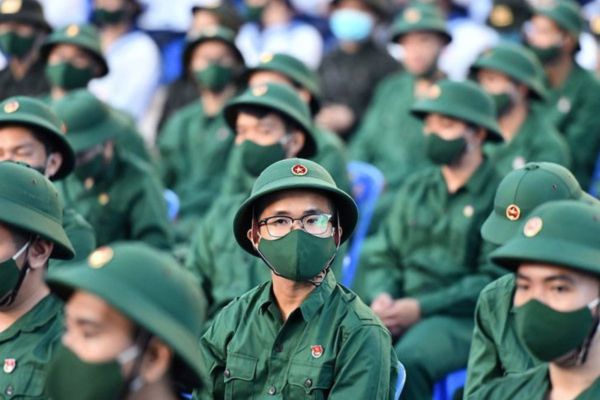Cases in which Citizens Participating in Military Service in 2024 Will Serve 30 Months of Active Duty under Current Law
Citizens Participating in Military Service in 2024 Will Serve for 30 Months in Accordance with Current Law?
Based on the provisions of Article 21 of the Military Service Law 2015:
Term of Active Service for Non-Commissioned Officers and Soldiers
1. The term of active service in peacetime for non-commissioned officers and soldiers is 24 months.
2. The Minister of Defense has the authority to extend the term of active service for non-commissioned officers and soldiers, but not exceeding 06 months in the following cases:
a) To ensure the readiness for combat;
b) While performing disaster prevention, disease control, rescue, and relief tasks.
...
Thus, in normal circumstances, citizens participating in military service in 2024 will have an active service term of 24 months. However, citizens participating in military service in 2024 will serve for 30 months if the Minister of Defense decides to extend the active service term in the following cases:
(1) To ensure readiness for combat;
(2) While performing disaster prevention, disease control, rescue, and relief tasks.

Citizens Participating in Military Service in 2024 Will Serve for 30 Months in Accordance with Current Law? (Image from the Internet)
What Benefits Do the Relatives of Non-Commissioned Officers and Soldiers on Active Duty Receive?
The relatives of non-commissioned officers and soldiers on active duty include: Biological parents; parents-in-law; legal guardians of the spouse; spouses; biological children, and legally adopted children of non-commissioned officers and soldiers on active duty.
According to the provisions of Article 6 of Decree 27/2016/ND-CP, the relatives of non-commissioned officers and soldiers on active duty are entitled to the following benefits:
- The relatives of non-commissioned officers and soldiers on active duty are entitled to emergency hardship allowances in the following cases:
(1) When the housing of the non-commissioned officers and soldiers on active duty suffers accidents, fires, or natural disasters leading to the collapse, drifting away, burning, or forced relocation, or when their property suffers severe damage, an allowance of 3,000,000 VND per case per time is provided;
(2) Relatives of non-commissioned officers and soldiers on active duty who are ill for one month or more or receive treatment at a hospital for seven days or more are entitled to an allowance of 500,000 VND per relative per time;
(3) In the event of death, or missing status of non-commissioned officers and soldiers on active duty, an allowance of 2,000,000 VND per person is provided.
- The emergency hardship allowance (1) is granted no more than twice a year for each non-commissioned officer or soldier; the emergency hardship allowance (2) is granted no more than twice a year for each relative of non-commissioned officers or soldiers;
What Contents Are Examined During the Military Service Health Examination?
According to the provisions of Article 8 of Circular 105/2023/TT-BQP, the examination of health for military service is as follows:
- The military service health examination is conducted by the Military Service Health Examination Council at the district level as prescribed in Clause 1, Article 40 of the Military Service Law 2015, consisting of:
- The Chairman of the Council is the Director of the District Medical Center or the Director of the District General Hospital;
- The Vice Chairman of the Council is the Deputy Director in charge of medical expertise at the District Medical Center or the Deputy Director of the District General Hospital;
- The Permanent Member and Secretary of the Council is the staff member responsible for state management of health at the district level;
- Other members are officials and employees of various departments including the District Medical Center, District General Hospital (if available), district health agencies, military medical staff of the District Military Command, and representatives of related units. If necessary, additional provincial health or provincial military medical personnel can be mobilized as decided by the Chairman of the Provincial Military Service Council;
- Council members ensure a complete set of departments, specialties as stipulated in Clause 5 of this Article and must have professional certificates or practicing permits suitable for their tasks as prescribed by the law on medical examination and treatment.
- Compile a list of citizens to be examined;
- Announce the time and place for the health examination (Issue the health examination order);
- Conduct health examinations including the following contents:
+ Physical examination; clinical examinations in specialized fields: Ophthalmology, otorhinolaryngology, maxillofacial, internal medicine, neurology, psychiatry, surgery, dermatology, gynecology (for females);
+ Paraclinical examinations: Complete blood count; blood group (ABO); liver function tests (AST, ALT); kidney function tests (Urea, Creatinine); blood sugar; Hepatitis B Virus (HBsAg); Hepatitis C Virus (Anti-HCV); HIV; urinalysis (10 parameters); general abdominal ultrasound; electrocardiogram; chest X-ray; urine test for drug detection. The Chairman of the Council may order additional tests based on medical requirements to ensure precise health conclusions.
Conducted in two rounds: Physical, clinical examinations, and paraclinical tests for screening HIV and drugs. If the citizen fails any of the health standards stipulated in Clause 1, Article 4 of Circular 105/2023/TT-BQP during the physical or clinical examination, the Examination Council member must report to the Chairman, who will decide to stop the examination. Only those citizens who meet the health standards after the physical, clinical examinations, ultrasound, electrocardiogram, and chest X-ray will proceed to have their blood and urine tested for HIV and drugs.
Organize consultations and HIV testing following legal provisions on HIV/AIDS prevention and control for those who meet the health standards.
LawNet




